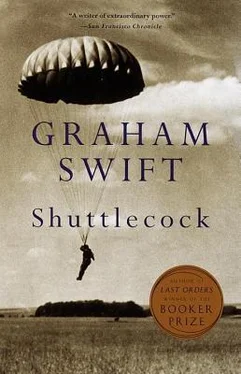But there is something else that draws me back to these last two chapters. Something harder to explain. These pages are more vivid, more real, more believable than any other part of the book. And yet, strangely enough, this is because the style of Dad’s writing becomes — how shall I put it? — more imaginative, more literary, more speculative. In the main body of the book — so I’ve explained — only the occasional brief passage of reflection, of emotion, breaks the brisk, adventure-book flow of the narrative. But in these final chapters it is as though the philosophic note is always there (that theme of war-in-peace and peace-in-war, for instance); and Dad’s words seem ever ready to take on a quieter, sadder, even eloquent tone — not at all the tone of the man who, quickly sizing the situation, stuck the knife into the guard’s back at Caen. It is there even in the description of those destructive retreating armies:
… All day long the columns poured through Dôle and Auxonne and on in the direction of Besançon and Vesoul. They left behind a wake of devastation. And yet it was impossible not to feel a degree of pity for these streams of weary, ill-kempt men who were no longer heroes or conquerors, ill-equipped and ill-transported, moving on, fleeing, like migrating animals obeying a mass instinct, up the river valleys, towards Mulhouse, the Rhine, and home.…
It is there in the very lines which follow those about the ‘contamination’ of the landscape:
… I remember there was a wood, a mile or so outside Ligny, a small wood of no great distinction — oaks, sweet chestnuts and hazels — but in which pheasants cackled and the sun fell on drifts of dead leaves. We must have skirted it, on bicycle or on foot, several hundred times, and unconsciously come to regard it as an emblem of things that would continue unchanged, regardless of the war. One day a group of five Maquisards were pinned down in this wood, and the Germans, in order to make sure of despatching them, poured mortar shell after mortar shell into it. I passed it soon afterwards: a smouldering, twisted array of stumps. Two of the five men I had known — and that week was to bring worse human tragedies; but I felt the loss of that wood like few human losses. The thing that most embodies the evil of war, is not, it seems to me, its human violence (for humans cause wars), but its wilful disregard for nature.…
And it is there on the penultimate page, before that awakening in the forest and the polite lieutenant from Connecticut:
… I made a hollow in the undergrowth, covering myself with leaves, and curled up in it. Some tall beech trees groaned in the wind above me. I was shivering, semi-delirious, hungry, had lost my sense of direction and did not know where I was. I remember thinking, before drifting into merciful sleep, Yes, I am no better than some burrowing animal.…
Another Wednesday. The evenings are getting longer. Under the cedar tree, on the bench, in the hospital grounds, I had this feeling of calm, of refuge. I was safe here. As the sun sets, the red bricks of the hospital walls start to glow; the windows gleam like copper. You do not have to put yourself at risk at all or endanger anything if you never make a move.
For a long time I sat beside Dad, as silent and as still as he was, and I thought: this could go on for ever. Sometimes I wonder what I am more afraid of: of Dad never breaking his silence, or of his suddenly speaking.
I don’t know why this weight lay on my tongue, which only a while before, on my drive down, had been itching with questions. It is easy to frame questions when you know there will be no answers. I wanted to say to him: what does the name Debreuil mean to you? Tell me about Z. Tell me. Yet what I wanted to ask, even more than this, was: What happened, Dad, in the Château Martine? Did they torture you? But I didn’t. I sat in silence several minutes more. It seemed to me we were like two weights on a balance, a swaying see-saw, precariously poised. And then I said: ‘I have got some news, Dad. I am going to be promoted. Quinn told me. Have I told you about my boss Quinn?’
Sometimes Dad is so still and sits so rigidly, it seems that if I touched him with the tip of my finger and gave just a slight push, he would topple, slowly and ponderously, onto the grass.
When I left the hospital the calm feeling still hung around me, though it slowly wore off, so that as I drove through Sutton and Morden I started to look in the driving mirror to see if I was being followed (a new habit), and my tongue started to itch again to ask those questions I had meant to ask Dad. As I neared home it was itching even more, though not to ask questions — to shout at Marian and the kids.
You know those surprisingly long, light evenings in early summer, when lilacs bloom in gardens and even in such mundane and humdrum places as Sutton and Morden a breath of peace seems to hang in the air as if it were really hanging over some wide, virgin landscape. On the way home I took a detour towards Wimbledon. I drove up to the golf course and pulled up in the car-park by the club-house. It was the sort of lingering end to the day (long shadows, a faint breeze, a sweet scent to the turf) which golfers must love. The light was beginning to fade but I could see several figures still, in coloured sweaters and flapping trousers, out on the fairways. The lights were on in the club-house and the doors open. I could hear a babble of voices. Someone was talking loudly about the price of property. The car-park had been enlarged and an extension added to the club-house since the days I remembered. Several members were already leaving to go home, jingling car-keys with a satisfied air and shouting sarcasms to friends across the gravel. It didn’t seem that their plummy, somewhat hollow voices were the equivalent of the voices I had heard when I was a boy, but perhaps they were.
I went into the club-house. There were men with reddened faces and cigars sitting at the bar. They looked at me suspiciously. The barman looked at me suspiciously too. Against one of the walls was a glass-fronted cabinet containing silver cups and plates and, fixed to the wall, polished wooden boards recording the winners of annual tournaments and competitions. The names went back over thirty years. Amongst them, appearing in one instance (’55–’57), three times in succession, was Dad’s name. But there was no name with the initials A. L. Not a winner, I thought. I could say to the men with cigars, like some hard-talking detective, Which ones of you knew Prentis? Did anyone here know Z? (Why is it that the questions fail you when you most think they will lead somewhere?) The barman was still looking at me curiously. I said: ‘It’s all right, I’m looking for someone — not here,’ and turned to the door.
I loitered a little while at the edge of the car-park. Golf courses, like commons, try to marry wildness with civility. Dusk was falling. The sweatered figures were trailing in across the grass, like returning hunters, with their trolleys and bags. As the light faded the clumps of birches and hawthorns seemed to loom more definitely, and then only the little fluorescent marker-flags stood out, like sentinels, on the greens.
It kept ringing in my mind, as if, were I to turn round, they would all be standing there: ‘Arthur, Arthur.’
The figures drew near and I could hear their breathy, invigorated voices.
Wwwhack! Wwwhack!
Today Quinn said to me, ‘Hear you’ve been coming into work early, Prentis. That’s commendably diligent of you.’ A tiny, ironically indulgent smile. But his eyes gave a little rigid stare, as if to show he knew everything and was gloating in his knowledge; as if, even with one of those podgy, pink hands of his, he could pick me up, tie me in knots, crush me. He had come down for once from his eyrie, down his flight of steps, and was favouring us with a visit. He was going round, this little plump man, amongst his juniors, who are all bigger and stronger than he, and yet they were saying, as he handed out routine instructions, ‘Thank you sir. Yes sir.’
Читать дальше












